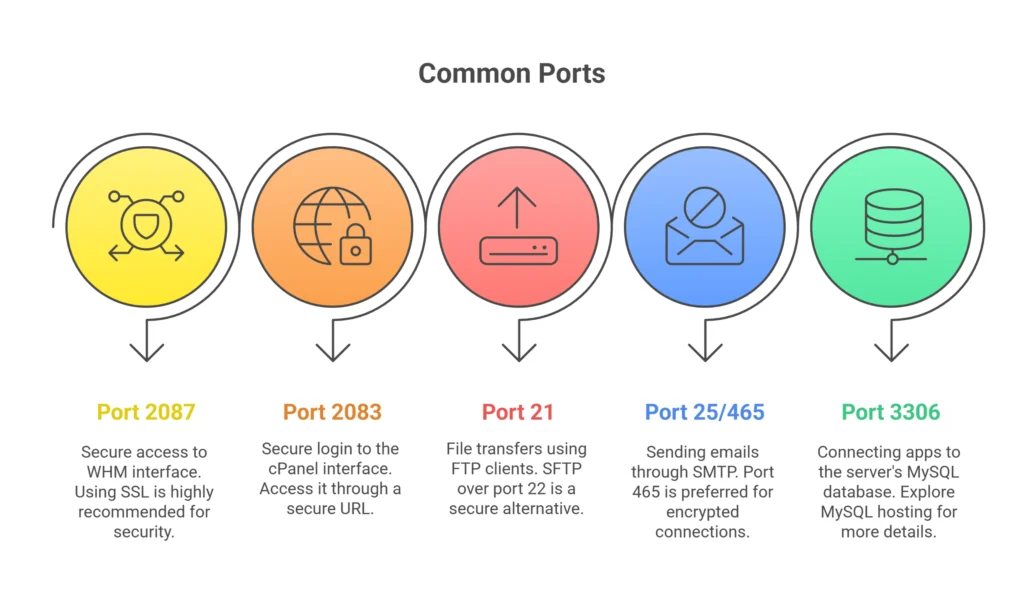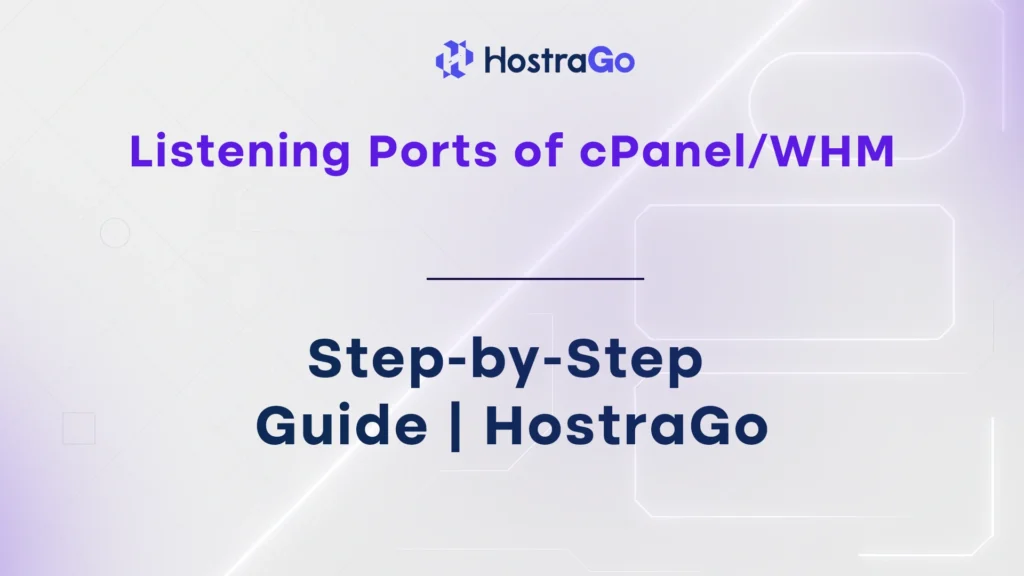Whether you’re running a VPS, a dedicated server, or even a cloud hosting platform, knowing the listening ports of cPanel/WHM is critical. These ports are how your server communicates with the outside world — from secure logins to webmail access, database management, and beyond.
Listening ports of cPanel/WHM refer to specific communication endpoints on your server that are used for essential services such as WHM login, FTP, SMTP, DNS, and cPanel access. Understanding these ports is vital not just for connectivity, but also for configuring firewalls, avoiding conflicts, and securing your hosting environment.
In this comprehensive guide by HostraGo, we’ll break down all the ports you need to know, how to manage them, and best practices for keeping them secure.
What Are Listening Ports?
A listening port is a network endpoint used by software applications to accept incoming connections. Think of it like a door on your server — each service (e.g., FTP or HTTP) listens on a specific door (port number).
For example:
- Port 2087 → WHM (secure login)
- Port 2083 → cPanel (secure login)
- Port 21 → FTP (file transfers)
- Port 25 → SMTP (sending email)
Why Are Ports Important in cPanel/WHM?
Every service in your hosting environment operates through a specific port. If a required port is closed or blocked by a firewall, services will not work correctly. That’s why knowing which ports cPanel/WHM listens on is essential for:
- Securing server access
- Configuring CSF or firewalls
- Troubleshooting connectivity
- Setting up external integrations
Default Listening Ports of cPanel/WHM
Here’s a complete table of default ports used by cPanel and WHM:
| Port | Service | Description |
|---|---|---|
| 2087 | WHM (SSL) | Secure WHM access |
| 2086 | WHM (non-SSL) | Unsecure WHM access |
| 2083 | cPanel (SSL) | Secure cPanel access |
| 2082 | cPanel (non-SSL) | Unsecure cPanel access |
| 2096 | Webmail (SSL) | Secure webmail |
| 2095 | Webmail (non-SSL) | Unsecure webmail |
| 21 | FTP | File transfers |
| 22 | SSH | Secure shell access |
| 25 | SMTP | Outgoing email |
| 465 | SMTP (SSL) | Encrypted email sending |
| 110 | POP3 | Receiving email |
| 995 | POP3 (SSL) | Encrypted email receiving |
| 143 | IMAP | Incoming mail |
| 993 | IMAP (SSL) | Encrypted incoming mail |
| 53 | DNS | Domain name resolution |
| 3306 | MySQL | Database access |
🛑 Important: Block unused ports to reduce security risks. If you don’t use FTP or POP3, disable those ports.
Common Ports Explained

How to Check Open Ports on Your Server
To view listening ports on your Linux server via SSH:
netstat -tulnp
Or using ss:
ss -tuln
This will show which ports are open, what services are listening, and their protocol (TCP/UDP).
How to Open or Close Ports Safely
Use the CSF (ConfigServer Security & Firewall) plugin in WHM:
- Go to WHM → Plugins → ConfigServer Security & Firewall
- Edit TCP_IN and TCP_OUT to open/close ports
- Save changes and restart CSF
For example:
- To open port 3306: add
3306to TCP_IN - To close FTP: remove
21from TCP_IN
Don’t forget to whitelist your IP during changes to avoid getting locked out.
Security Best Practices for Port Management
- Use SSL ports only (2083, 2087, 2096)
- Disable unused ports like 2082, 2095, 21
- Use firewalls (CSF/UFW) to restrict access
- Enable Fail2Ban or ModSecurity for extra protection
- Regularly scan open ports using tools like Nmap
Want to secure your server better? HostraGo VPS Hosting gives you root access and advanced firewall tools.
Frequently Asked Questions
Q1: Can I change the default ports in cPanel/WHM?
No. cPanel reserves these ports, and modifying them can break functionality.
Q2: How can I test if a port is open?
Use telnet yourdomain.com port or free online tools like YouGetSignal
Q3: Is it safe to keep FTP port 21 open?
Not really. FTP is insecure. Use SFTP over port 22 instead.
Q4: What port does Let’s Encrypt or AutoSSL use?
Ports 80 (HTTP) and 443 (HTTPS) must remain open for SSL certificates to renew.
Final Thoughts
Knowing and managing the listening ports of cPanel/WHM is critical for every web server admin. These ports are the gateways to your server’s essential services — from WHM login to email delivery.
If you’re using HostraGo hosting services, you get full access to port management via WHM and firewall tools for complete control.
Need help setting it up? Contact our support — we’re available 24/7 for assistance.
Looking to level up? Check out our powerful VPS Hosting in India with advanced security and root access.


